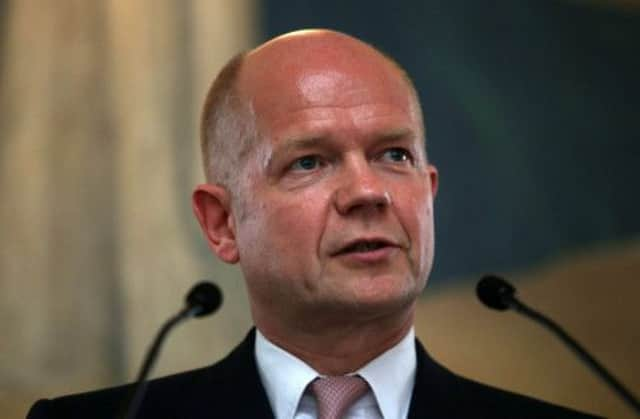Leaders: Syria | Budget airlines


Dismissing the chances of the attack originating from rebels seeking to discredit the Damascus regime as “vanishingly small”, the Foreign Secretary pinned the blame for the atrocity firmly on Syrian president Bashar al-Assad.
However, blaming Mr Assad for this appalling massacre is, in some respects, the easy part of Mr Hague’s role. What will be far more difficult for him, and indeed for the rest of the world, is to find some way of stopping the flames of conflict in Syria spreading to the tinderbox that is the Middle East, something which could lead to the deaths, not of hundreds or even thousands of people, but of many, many tens of thousands.
Advertisement
Hide AdAdvertisement
Hide AdAn immediate objective for the Foreign Secretary has been to join with allies, such as America, on the United Nations Security Council to win backing for chemical weapons inspectors already in Damascus to inspect the scene of the recent attack. Time is of the essence as the evidence of a chemical attack can disappear in a relatively short period. So far, Russia and China, for their own political reasons, have blocked this move, but they cannot be allowed to wield the veto forever.
If these two superpowers cannot be persuaded to back the inspection, then the UK, along with the US, France and others, will first have to find a way of ensuring the inspections can be carried out – and thereby prove beyond further doubt who was responsible for the attacks – but also to take wider action, which should be aimed at ending the fighting, or at least containing it with a view to ending it.
Hinting there could indeed be such action, Mr Hague yesterday promised the UK would use “any option that complies with international law and could save innocent lives”, though he did not go into further detail. There will be those who say that such moves are dangerous. That they could, once again, lead Britain into involvement in a conflict in which there may be no clear winners and from which there is no clear exit strategy – another Iraq in other words.
However, these critics, while right to have reservations, have to answer a fundamental question: what is the alternative? Can the UK, still a major global power, stand by while innocent civilians die? Can we pass by on the other side of the international street, turning our head away and pretending not to see?
The honest answer is that we cannot, and if that means the UK and her allies moving towards intervention short of “boots on the ground” in order to save lives, then this is an option Mr Hague, Prime Minister David Cameron – and an up-to-now over-cautious Barack Obama – should contemplate. The UK, the rest of the world, simply cannot in all conscience do nothing over Syria.
Up in the air on prices
When the first budget airlines burst on the scene they revolutionised travel for ordinary people. By cutting back on the extras, such as food service and seat booking, they took on the complacent fat-cats of the air and dramatically brought down the cost of flying for millions.
However, as the market in what can still accurately be called no-frills air travel has matured, with the once mighty global carriers forced to compete on price, it is doubtful whether many of the companies now in the business can still correctly be called budget airlines. This point has been highlighted by a report by the ever-vigilant consumer group Which? that has revealed travellers could cut their costs sending their bags to their destination in advance, rather than paying the airlines to put them in the holds of planes.
The report found that a typical passengers travelling on a flight to Rome from the UK could save £12 by sending bags ahead with a courier firm, compared with paying £35 for transporting their bags to and from their destination with one carrier.
Advertisement
Hide AdAdvertisement
Hide AdIn this example that was Ryanair, but while the company was the most expensive of those surveyed, it was by no means the only airline where it would have been cheaper to send luggage by courier.
What conclusion can we draw from these findings? First, that by adding on extra costs for everything from food to hold baggage, the so-called budget airlines are becoming increasingly like the behemoths they usurped.
Secondly, it is time for some honesty in terms of airline pricing. Extras are no longer really extras and should be included in ticket prices.